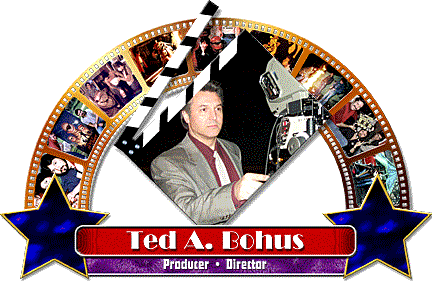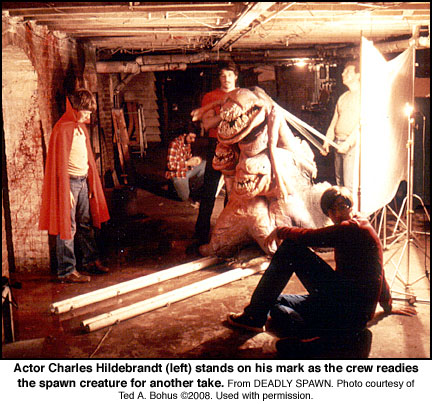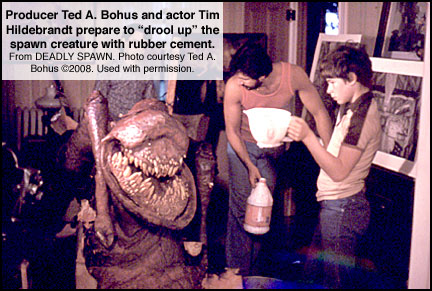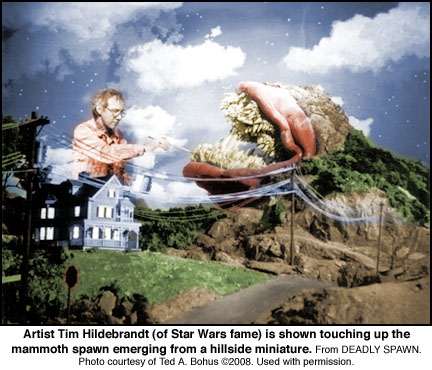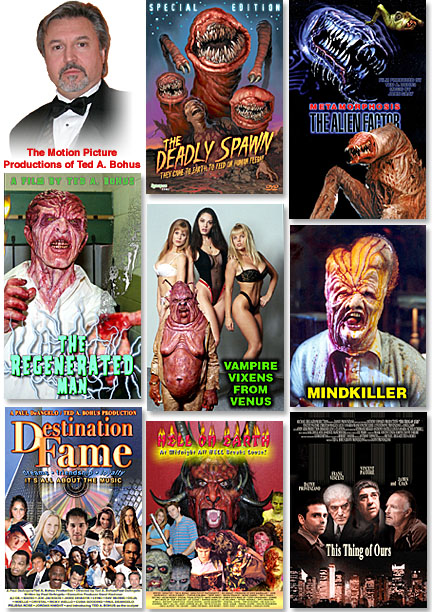Search
An interview with Producer/Director Ted A. Bohus on the Hell’s of Distribution
by Robert Long II
Robert: Ted, I was watching one of your earlier movies (Deadly Spawn) with your commentary track on. I found it of great interest the problems you had with the company that had originally distributed it. Can you give us a little background on that? The problems, mistakes, the lies, and the ultimate outcome of it all?
Ted: Well, I was very young in the business then. Getting the film completed was difficult enough, but my head was spinning when many offers came in from distribution companies. Troma wanted it, but didn’t want to pay an advance. All the other companies offered an advance. Just for laughs I called Paramount Pictures (then located in New York) and told them what I had. They asked for a screening and after I went up to the offices and had a great time with the office staff, they were all rooting for me. The film was approved for pick up by the New York office, but now had to be sent to California. About a week later I got the call, and with heavy heart they had to tell me that the California office thought the film “a little too rough” for distribution by Paramount.
RKR Pictures put in a bid, but then a company called 21st Century wanted to meet with me. When I looked it up, I found they were a publicly held company…with stock and everything! In my mind this put them above the other companies. I figured they had by-laws and everything. They made an offer I thought was fair. I took this offer back to Troma (because we also got long great) and told them if they could equal or beat it, I would go with them. They thought I was bluffing and the day I signed the contract with 21st Century, they called me for a meeting. I told them the film was already sold.
The deal with 21st Century called for a theatrical release. They were to pay me $50,000 upon signing the contract and another $50,000 within a certain amount of time. When I saw the Variety headline…“New York opening at 50 theatres…first week….$320,000” I thought that was it! A few weeks later I get a statement from 21st century. I opened it and my eyes scanned down the figures. The last figure…$60,000. Not too bad, but with that New York only opening figure, I thought I would get a bigger check. Then I realized what that figure was. I owed THEM $60,000! But they would be nice and deduct it from future earnings.
How can this happen? Very much later I met up with a disgruntled employee who just happened to do their books. He gave me a lesson and showed me why I would never see another dime from the film. The crooks, er, owners of 21st Century had it all worked out. If the film made, say, $100,000 in Texas, they deducted shipping, storage, newspaper ads, TV ads, magazine ads, film prints, pamplets, billboards, etc, from what would come to me. Now you would think these costs were very easy to check up on….hah! Here’s how it worked. They take out 5 full page ads in 5 different newspapers in Texas. They get sent receipts for $10,000 per page. They only actually pay $2,000 per page and put $1,000 in someones pocket. Now apply this to most of the other costs. If the film made $100,000 in Texas, it would work out that I owed THEM $20,000.
I eventually had to sue 21st Century, won, and got my rights back and a bunch of worthless stock. The moral is: you’ve got to watch your contract. Make sure you put limits on what can be spent. Get approval on some costs. Have a performance guarantee and always get an advance. Put in a clause that if the company goes out of business they cannot sell your film to another company…the rights revert back to you. And ALWAYS keep the originals or copies of your originals in your possession.
Not too long after, 21st Century went out of business. People were catching on. So remember, just because a company is publicly traded…they can screw you just the same. Now don’t forget, most of this advice applies if companies want your film. If you can’t get a distributor, you might have to settle for whatever you can get. Just don’t be surprised when you get it in the back!
Robert: You have done several movies and projects since then. Does it ever get any easier dealing with distributors?
Ted: Not really. It’s become a little more common knowledge of how they can screw you. But, they are a resourceful group and always find new and creative ways of using your money. Don’t get me wrong, there are plenty of honest distributors out there. Do your research! Contact other people who have had films distributed from a company you are interested in. Other filmmakers will be only too happy to share horror stories with you. The main thing is you have to make a film with some quality to it that distributors WANT to pick up. Or a novelty picture with a topical subject. Timing and luck are the biggest factors. Look at Blair Witch Project. No big deal! Timing and luck. Timing and luck! No matter how expensive your film is, no matter how many big stars you have…there is no guarantee big hit. Last Action Hero, Havana, Bonfire of the Vanities….big stars…big budgets…big publicity…big bomb! Make the best film you can, and remember….timing and luck!
Robert: It seems now that anyone with a camcorder wants to make a movie and release it. With a very crowded marketplace, what can the independent filmmaker do to get their film noticed by a distributor? What are distributors looking for? What aren’t they looking for? What materials should the filmmaker have on hand before approaching a distribution company?
Ted: As I said, just try to make the best film you can. Start off with a good script. It doesn’t cost much at this stage to really put time into developing a good story and interesting characters. I always tell newcomers to start off with sci-fi or horror, because no matter how bad the film might turn out, chances are, you’ll find a distributor.
Every distributor might be looking for something different. There are some that specialize in horror, or comedy, or period pieces. All companies ultimatly look for the same thing…will distributing this film bring in a profit.
If you approach a distribution company after you have a finished product (the best way to go) have a copy of the film, an M&E mix (music and effects) so it can be dubbed, PLENTY of pictures and any supplemental material they could use for DVD extras. Most other things like E&O (Errors & Omission) can be worked out with the distributor. If they want the film, they’ll advance the cost and recoup it. You don’t have to go too crazy worring about publicity because the distributor may want to put their own particular spin on it.
If you’re approaching a company with nothing but a script…and want to get money for a low budget film…..nah! No sense even getting into it!
Robert: With DVDs going like gangbusters with additional info on them, should the independent filmmaker try to have as many extras available as possible for bonus materials?
Ted: Yes, absolutely! With DVD being as big as it is, everyone wants to see the behind-the-scenes stuff. Make a making of documentary while shooting the film. Have a nice long blooper reel and take as many pictures as you can. Pictures are the lifeblood of the publicity campaign. High Def DVD will be around by the end of this year or no later than next (2006). Shoot your film on a digital (HD) format if possible. 24p cameras are very affordable these days. I shot my last film in 24p and plan to shoot my new film, Hell On Earth, that way. I always shot on film, but if it’s good enough for George Lucas…..
Robert: Obviously it is smart to have a lawyer on your side to look over any contracts and explain them before the filmmaker signs on the dotted line. There are several different types of lawyers out there. How does one find a contract or entertainment lawyer? What should the low-budget filmmaker expect to pay for their services? Are there any law firms dealing with independents that you would recommend?
Ted: If you’re dealing with a really low budget film and have no money for legal advise or contracts, visit your local lawyers and ask if they’ll work for a percentage of the film. I did this twice with very good results. All my lawsuits for Deadly Spawn were handled this way. A lawyer charging between $150 and $300 an hour is out of the low budget filmmakers range. You can also rent legal books from the library and copy the sample contracts in them. This is how I got my very first contracts.
Robert: What do you feel is the best kind of deal to make with a distribution company? What are the other possible deals offered that the filmmaker should accept? What are the type of deals they should avoid?
Ted: The best kind of deal is one with an advance, performance guarantee, limited recoupable expenses, a good percentage, getting your rights back if the company goes out of business and a good feeling about the company your working with. Like I said…do your homework.
Robert: You have talked about being careful about turning over your master print to the distributors. Can you give the reader a little detail as to why?
Ted: If anything happens, such as the distributer going out of business, it could be VERY hard to get your materials back. If the distributor owes money to the lab, they will hold the material. ALWAYS have your own copy. And I mean photos, behind-the-scenes videos…everything.
Robert: Now a person CAN just sell their movie outright and hope to at least get their money back and maybe a little more to start another project. First off, it sounds like they have given up any and all rights for the film in return for a decent chunk of change. Do you believe this to be a viable route to go? What can the filmmaker do to at least insure that their NAME is still attached to the film, even if the rights are not. Should that be in the contract?
Ted: Yes, all those terms will be spelled out in the contract. If a distributor wants to own the film outright and you are satisfied with the deal, there should be no problem. Sometimes I prefer this as you rarely, if ever, see any money after the advance.
Robert: Have you run into distributors that have tried to pressure you to sign on the dotted line without really thinking it over and looking at it with your lawyer? Did they use any sort of tricks or intimidating tactics? If so, how did you handle it, and what would you advise the reader to do in this situation?
Ted: Any legitimate distributor should make sure you have time to look over the deal. If you are being rushed…walk away. This is a red flag.
Robert: Do you think self-distribution (websites, conventions, mail order) has a chance? Is there any pros to it? It sounds expensive. Would you know the starting price of what a person can expect to pay to get the movie pressed and boxed if they do it themselves?
Ted: Self distribution is a pain. You can have a GREAT website, but if nobody knows it’s there, what difference does it make? You need big money to advertise your website. To press your own DVDs you need the artwork for the jacket, for the disk, maybe a booklet and the elements to be put on the disk. Look to pay about $2.00 or more each depending on how fancy you want them to be. Unless the film is shown around and has good word of mouth, just selling them at conventions is not enough. You don’t want to make hundreds of dollars, you NEED to make thousands. If you have no other choice, try to share links with as many websites as you can. Cross promotion is the way to go.
Robert: While a good distributor will do their best to get the filmmaker’s movie into stores and video chains, what can the filmmaker themselves do to help promote it for more sales? Should the filmmaker be working just as hard at that a the distributor?
Ted: It can’t hurt…unless they don’t want you involved with the publicity. You can make appearances at conventions and show your film, then sell them at your table. Having the beautiful lead character behind the table can’t hurt either. Also sell photos, trading cards, etc. In your contract it would be nice for you to keep all merchandising rights. This shouldn’t be a problem with most low budget fare.
Robert: In this market, when do you think the filmmaker can realistically start seeing some returns coming in from the distributor (provided they got an honest one). Six months? A year? Longer?
Ted: When I got anything, it was usually at about the 6 month mark. Again, it depends what it says in the contract. You could also get a little taste from first dollar. But that’s if they REALLY want the film.
Robert: This is the movie BUSINESS. Does the distributor take care of all the taxes and legal headaches, or should the filmmaker be prepared to have to handle some of those headaches themselves?
Ted: Yes, when you get paid, you take care of your own taxes. There will be a clause in the contract that states that you have full rights and ownership of the film. If you have not disclosed something and a legal situation arises, you could be held accountable. Make sure your paperwork is in order and don’t try to hide any questionable situation as it may come back and bite you in the ass.
Robert: Ted, as you have been very involved with this matter over the years, is there anything important the reader should know that I haven’t covered? If so, please explain.
Ted: I know all of this sounds rather depressing, but try to have a good time making your film. If you can find someone else who has made and gotten distribution for a low-budget film, this would help a lot. The more problems you can be prepared for, the better. Take your time in pre-production and plan out everything. Make storyboards. Do everything you can to save time during filming. Once you’re in production, every minute costs you money. Be prepared.
Robert: Any final words to our readers?
Ted: Always try to make your film look as professional as possible. If you need an old man, get an old man. Don’t have all young actors playing older. Get someone that really knows about lighting. A badly lit film is a sure giveaway of low-budgetosity. Your key people, if possible, should have some expierence. Cinamatographer, gaffer, script supervisor, production manager, editor. Don’t forget, your goal is to fool the distributor. The more money it looks like you spent, if the film is good, the more you will be offered. When you spend $30,000, make it look like $200,000. Write a good tight script. Don’t make one of those films that have 20 minutes of boring dialogue and then 30 seconds of action or effects and then another 20 minutes of boring dialogue. If you need to, cut a very cool, action packed trailer. And finally, learn from your mistakes, never get too cocky. No matter how many times you’ve done it, every film is a challenge. That’s it…start doing your homework.
About Independent Filmmaker Ted A. Bohus
In the 70’s Ted produced several fantasy short subjects and wrote for various film magazines. In 1977 he published and edited his own magazine called SPFX-Special Effects Magazine. After a few issues he quit to produce and write several low-budget science fiction/horror films including FIEND and NIGHTBEAST. In 1993 Ted resumed publication of SPFX and does to this day.
In 1980 Ted started his own production company FILMLINE COMMUNICATIONS. He produced and wrote the story for his first theatrical feature, THE DEADLY SPAWN. The film was distributed by 21st Century and AB Enterprises. Throughout the 80’s Ted worked on various films as producer, director, story consultant, writer, special effects designer/supervisor, 2nd unit director, and stunt actor. These films include MIND KILLER, LONE WOLF, GAMBLIN, and THE AMITYVILLE CURSE.
In 1988, after a year working with partner Dr. Ron Giannotto to raise backing for the film, then titled DEADLY SPAWN II : METAMORPHOSIS, financing was secured. The film was then produced under the title METAMORPHOSIS: THE ALIEN FACTOR. Trimark Pictures secured domestic distribution rights. Beside producing the film Ted also served as story writer, creature designer, stuntman, and second unit director.
Ted has also produced the anthology films FANTASTIC FILMSHOW I & II and directed various episodes.
THE REGENERATED MAN, which Ted wrote, produced, and directed has been sold to Arrow Entertainment for world distribution. Shot in 35mm the film contains a computer animated creature created with the same software used for the dinosaur effects in Jurassic Park.
Ted produced, directed and wrote the sci-fi/comedy VAMPIRE VIXENS FROM VENUS for Shanachie Entertainment. The film has been released on video and had a successful run on USA TV network “Up All Night.”
In 1994, Ted was the host, producer and director of HOLLYWOOD EAST RADIO. WVNJ 1160. The radio show consisted of interviews with movie personalities and call-ins. Also, with co-host Joanne Santiglia (Ch. 10 Time Warner News) he produced, wrote, directed and edited a 1/2 hour news magazine program for cable television. HOLLYWOOD EAST contained interviews and film clips. It was nominated for the Cable Ace Award. It was shot at New York’s PLANET HOLLYWOOD. In 1997, Ted was the director and producer of the 16mm coming of age film, GENERATION X.
During 2001-2002 Ted co-directed, produced, wrote and acted in the 35mm feature THIS THING OF OURS. It stars, James Caan, Frank Vincent, Vincent Pastore, Pat Cooper, Chuck Zito, Vinny Vella, Joe Rigano, Danny Provenzano and Louis Vanaria.
In 2003, Ted, with partner Paul DeAngelo produced, directed and co-wrote the teen oriented feature film DESTINATION FAME. It stars AJ Gil (American Idol) Cuba Gooding, Joe Jackson, Mario, Lyric, Ricky Aiello, Jordan Knight and a host of surprise celebrity guests. Music from the film will be released as a double CD.
Ted has written a book, MAKING LOW-BUDGET SCIENCE FICTION FILMS: A REAL HORROR STORY. McFarland is interested in the book and he hopes to turn it in sometime this year.
Six additional projects are in development for production, HELL ON EARTH, FIRST CONTACT: THE VISITOR, LOVE BY DESIGN, STARDANCER, THE BIOGENESIS EFFECT, ALIEN ON EARTH and NEW YORK COWBOYS.
Ted also works with Kevin Clement and Chiller Theatre Enterprises. They produce one of the biggest sci-fi/horror/fantasy conventions in the country as well as publish Chiller Theatre Magazine.
